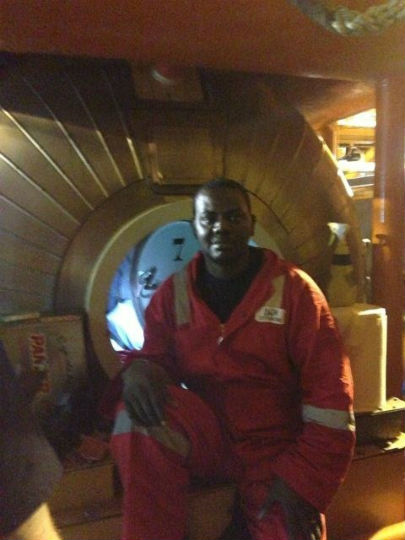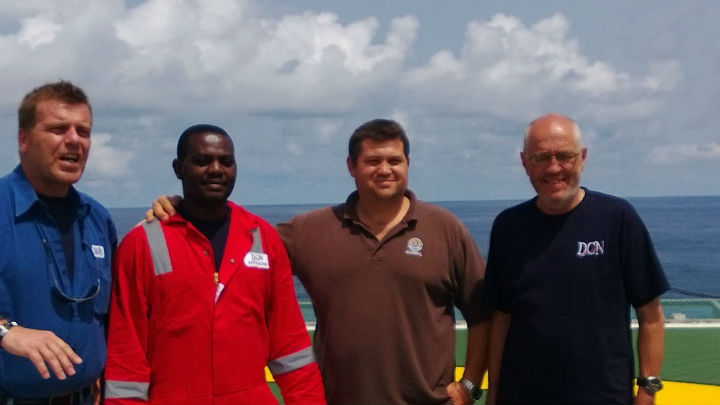Video: Amazing video emerges of the rescue of a Nigerian man after more than 60 hours underwater. Eric Sorensen has details.

VANCOUVER – Divers off the coast of Nigeria only expected to bring bodies back from a recovery mission in May, but when reaching for a hand floating in the murky water, they were shocked to find it was survivor.
New video released by DCN Diving, the company that employs the divers, shows the dramatic rescue.
Watch the full video of the rescue below
The Jascon-4 tug capsized at about 4:50 a.m. on May 26, while trying to stabilize a tanker filling up at an oil platform with 12 crew on board. The boat settled on the ocean floor 30 metres below.
The South African dive team, tasked with searching for bodies two days after the accident, captured the dramatic moment when one of the divers grabbed the hand of 29-year-old Harrison Okene — the ship’s cook.
“He’s alive! He’s alive,” shouts one of the divers, in the video released this week, as they realized there was a survivor still on board.
Okene managed to survive for two days in an air pocket in the hull of the overturned ship, for 62 hours.
The space he survived in was a mere four feet high — a bathroom in the front end of vessel, down the corridor from where he was when the tug first flipped over — drinking Coca-Cola to stay hydrated.
“I was there in the water in total darkness just thinking it’s the end. I kept thinking the water was going to fill up the room but it did not,” Okene told Reuters back in June.
The survival story is an amazing one.
Okene also had to endure knowing his dead crew mates were nearby.

Get daily National news
“I was coming out of the toilet it was pitch black so we were trying to link our way out to the water tidal (exit hatch),” he said in the interview. “Three guys were in front of me and suddenly water rushed in full force. I saw the first one, the second one, the third one just washed away. I knew these guys were dead.”
“I could perceive the dead bodies of my crew were nearby. I could smell them. The fish came in and began eating the bodies. I could hear the sound. It was horror,” he told Reuters.
But on the afternoon of May 28, the sound he heard was the divers hammering on the boat. He said he swam to where he could make noise and eventually saw the light of one of the divers’ torches.
Jed Chamberlain, commercial manager for DCN Global and the lead on the mission, told BBC it was the second diver that passed Okene that caught his hand. Chamberlain explained Okene had missed the hand of the first one.
“Needless to say, the diver got quite a fright,” he said.
The divers that rescued Okene had to work carefully to bring him back to the surface. While they quickly suited him up in dive gear — Chamberlain said the divers had to teach him how to use it — Okene had to spend two and a half days in a hyperbaric chamber before he could step out into the fresh air on the rescue ship’s deck.

“He was in-gassing nitrogen, which is not metabolized by the body, so it builds up in tissue,” Chamberlain explained. “If you release pressure, in other words you ascend to the surface, when you’ve in-gassed excess amount of nitrogen it forms bubble(s) in your blood and it can stop the blood flow to the brain and vital organs and can result in death. ”
Chamberlain told BBC Okene was “absolutely calm” throughout the rescue effort and his recovery.
“You don’t hear about stories like this very often,” he told BBC.
In his interview with Reuters in June, Okene said “it was a miracle.”
“I don’t know what stopped the water from filling that room. I was calling on God. He did it.”
While Okene’s story had a happy ending, the accident ended in tragedy for the rest of the crew. The divers recovered the bodies of 10 other crew members. One was never found.





Comments